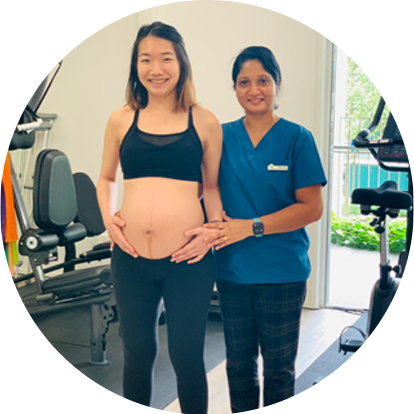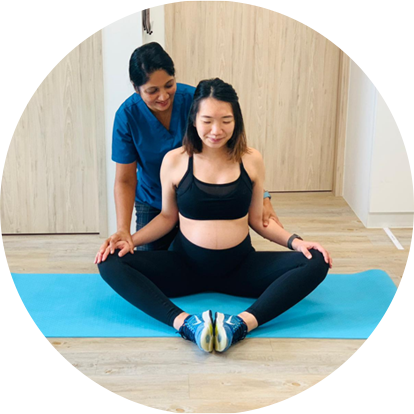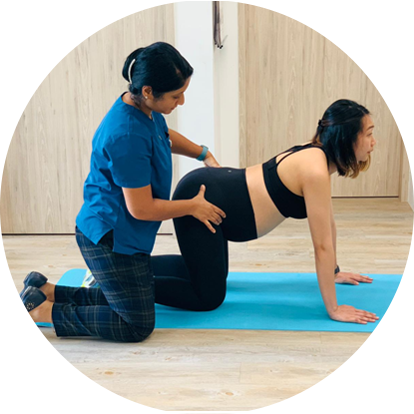Antenatal & Postnatal Care in Singapore
Physiotherapy can play a vital role in preventing and managing the physical discomforts and problems that can arise from the way our body adapts and changes during pregnancy (antenatal) and after childbirth (postnatal). Such musculoskeletal changes may be overlooked in your routine checkups. However, by working with a Women’s Health team at a physiotherapy clinic in Singapore, you will be able to identify and rectify those issues with physiotherapy.

Common Physical Problems During & After Pregnancy
Antenatal
- Lower back pain
- Pelvic pain
- Upper back pain
- Rectus diastasis
- Carpal tunnel
- Bladder urinary incontinence
Postnatal
- Continuation of back and pelvic problems due to:
- Changes in soft tissue and joints
- Continued presence of relaxin (a hormone produced by the ovary and placenta) during post delivery and breastfeeding
Importance Of Postnatal Physiotherapy
After pregnancy, it’s common to feel too exhausted or physically burdened to start exercising again. This is especially true when you experience symptoms like pelvic pain, which can make it appear counterintuitive to exert your body further. However, postnatal physiotherapy is crucial for promptly addressing these issues to safeguard your long-term health.
One of its major benefits is in addressing urinary incontinence. During pregnancy, the pelvic floor undergoes stress from supporting the extra weight of the growing womb, and the weakened muscles can struggle to control urinary functions. With postnatal physiotherapy, you can strengthen the pelvic floor muscles and muscles around the bladder, vagina, and bottom. This helps with incontinence and eases the intensity of pelvic pain related to pelvic prolapse – a condition where pelvic organs shift from their normal position.
Notably, postnatal physiotherapy is effective in reducing the risk of postnatal depression, a condition that affects as many as 10.4% of mothers in Singapore. This is because physiotherapy exercises can increase blood circulation to the brain, reducing physiological reactivity to stress and uplifting your mood. Through these ways, physiotherapy improves your overall physical and emotional well-being.
Frequently Asked Questions About Postnatal Care
When should I start prenatal or postnatal care?
Mothers-to-be in Singapore should start with prenatal care early in their pregnancy. This is crucial for managing preexisting conditions, reducing pregnancy complications, and promoting a healthy lifestyle and diet to improve the outcomes for mother and child. Receiving postnatal care promptly after childbirth is also recommended to help mothers adapt to and recover well post-delivery.
What treatment can I expect as part of my prenatal and postnatal care?
Antenatal physiotherapy sessions in Singapore may focus on managing lower and upper back pain, pelvic pain, rectus diastasis, carpal tunnel, and bladder urinary incontinence. Meanwhile, postnatal care will address back and pelvic issues caused by soft tissue and joint changes and the presence of the hormone relaxin in the body.
How long do I have to commit to the programme?
The duration and regularity of prenatal and antenatal care can differ based on several factors. These include the nature of the delivery (whether vaginal or caesarian) and whether any complications occurred during pregnancy or birth. Your healthcare provider in Singapore will be able to advise on the duration of your programme.
Importance Of Pregnancy Physio
Besides the conditions that arise after delivery, expectant mothers in Singapore may also face specific challenges during pregnancy. One common issue is pelvic girdle pain, which results from posture changes and increased pelvic pressure due to the baby’s weight.
Another condition that affects mothers-to-be is urinary incontinence. This often results from the added pressure of a growing abdomen, elevated progesterone levels, and potential injuries to the pelvic floor, making women more susceptible to this issue.
Undergoing physiotherapy during pregnancy can help prevent these prenatal conditions. Your physiotherapist may prescribe manual therapy to keep your joints and soft tissues safe and effective throughout pregnancy. You will also learn about proper body mechanics, enabling you to avoid exerting undue pressure on certain areas of your body.
Above all, receiving physiotherapy during pregnancy can ease the childbirth process. In fact, physiotherapy has been shown to alleviate pain during contractions and labour and potentially shorten labour duration. This not only eases the birthing process for the mother but may also reduce complications such as post-partum haemorrhage or prolonged labour.
By engaging in regular physiotherapy sessions, mothers-to-be can manage their physical discomforts during pregnancy and prepare the body for a safer delivery. These make physiotherapy a valuable aspect of antenatal care.
Physiotherapy Exercises For Antenatal Care
When receiving physiotherapy as part of your antenatal care routine, your chosen physiotherapist in Singapore might tailor the exercises to focus on:
- Pelvic Floor Exercises (“Kegels”): Kegels help with strengthening the pelvic floor muscles which improves bladder control, supports pelvic organs, and help control incontinence of urine, bowels, ensuring comfort during and after pregnancy.
- Breathing Exercises: Abdominal breathing and lateral costal breathing exercises help optimise body oxygenation and promote mental calmness.
- Core Strengthening: These strengthen your spine-supporting muscles to combat lower back pain caused by pregnancy-related postural changes. Abdominal strengthening exercises also helps to improve diastasis recti, which is a condition results from separation of rectus abdomen
- Posture Improvement: Your physiotherapist will help to advise proper posture which improves patients’ spinal alignment while carrying a baby to prevent from lower back strain or discomfort.
Frequently Asked Questions About Postnatal Care
What is the aim of antenatal physiotherapy?
Antenatal physiotherapy aims to ensure a safe and healthy pregnancy for expecting mothers by preparing their body for delivery. Engaging in antenatal care also promotes the well-being of the developing baby and offers an opportunity for expecting mothers and their partners to receive health education from their physiotherapist in Singapore.
What are some of the common conditions a physiotherapist can help during pregnancy?
During pregnancy, a physiotherapist will assist expectant mothers with various conditions. These include pelvic girdle pain, lower and upper back pain, and urinary incontinence. They will also address abdominal muscle separation, carpal tunnel syndrome, and postural changes, which are conditions that can cause pain post-delivery, ensuring the comfort and health of mothers-to-be.
What Do Antenatal & Postnatal Care Entail
A physiotherapy clinic will provide holistic physio care during and after pregnancy for patients in Singapore. They include:
- Advice and education on antenatal and postnatal care, including but not limited to posture analysis, back care, lifting and carrying your baby, and body changes during and after pregnancy.
- Alleviation of joint aches, for example, back and pelvic pains associated with pregnancy and after childbirth, through core stability training programmes designed to help support the spine and other joints.
- Provide Manual therapy (massage/soft tissue release/joint mobilisation) for tight/overactive muscles and painful joints, particularly around the spine and pelvic region, in response to the altered body shape and abdominal weakness.
- Pelvic floor strengthening supports the uterus, eases female urinary incontinence and your labour experience.
Physiotherapy can provide a healthier and more pleasant pregnancy, and a safe and speedy return to ‘normal’ so that you can spend quality time with your baby and enjoy your experience as a new mum.

Sign Up For Antenatal Care Classes in Singapore

Want to learn more about your pregnancy, the issues that may develop, and how exercises can help? Antenatal Care classes cover a range of topics, including:
- Pregnancy-related changes in your body/posture/common problems (i.e. low back pain, groin pain, incontinence) faced during/after pregnancy
- Exercises that can help with your pregnancy and prevent/resolve pregnancy-related problems
- Stages of labour and your husband’s role in postnatal care
At Rapid Physiocare, we have helped new mums and mums-to-be in Singapore throughout the antenatal and postnatal stages. With the guidance of a physiotherapist, you will learn about the bodily changes throughout your pregnancy and receive appropriate physio care. Your physiotherapist will also advise you on the best methods to address the physical problems as they arise. We also provide paediatric physiotherapy, which includes baby massage, colic pain in newborns and more.
Chat with us online, call +65 6904 4900 or book an appointment today to enquire about antenatal and paediatric care in Singapore or how Women’s Health Physiotherapists can help alleviate your pain.

